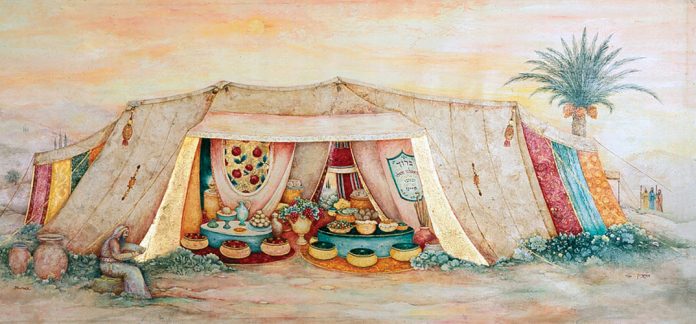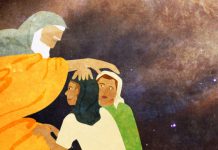Over the mountains was a little cloud, unlike any cloud he had ever seen. “This must be the spot,” Abraham proclaimed to his son Isaac.
As Isaac, age 37, carried the firewood on his shoulders, the elderly Abraham held the slaughtering knife and kindling in his hands.
“Father, I have a question!” asked Isaac. “We are going to offer a sacrifice to God. Here is the fire and the wood, but where is the lamb?”
Abraham replied: “God Himself will provide the lamb, my son,” implying that Isaac himself would be the lamb.
“And they both proceeded together” (Genesis 22:8), silently aware of the difficult mission ahead of them.
When they arrived at the spot, Abraham built an altar and placed the firewood and kindling upon it. Isaac allowed himself to be tied tightly to the firewood, and then Abraham lifted the knife.
The greatest act of self-sacrifice in the annals of history was about to begin. It stood against all of Abraham’s principles; it contradicted his entire concept of a loving God. From then on, Abraham would no longer be able to teach the pagans about a God of kindness that shunned human sacrifice. “What happened to your son?!” would be their retort.
And what of all the promises Abraham had received? Isaac, miraculously born to parents aged 100 and 90, was to become the father of a nation that would light up the world. If he were sacrificed, how would there ever be a Moses or a Maimonides?
On the other hand, if Abraham refused a direct command from his Creator, his life would be meaningless.
Abraham put aside all of his questions and dutifully followed God’s instructions. As he poised the knife, ready to perform the act, an angel stopped him at the last moment. “Do not touch the lad,” the angel proclaimed. (Not even a token cut to prove you’re serious!) “You have passed the test, and I now know that you fear God” (Genesis 22:12).
At that moment Abraham noticed a ram, bellowing as it struggled to free itself from being caught in a thorn bush. Abraham rushed to the ram, and sacrificed it in his son’s stead. The binding of Isaac would become the act for which the Jewish people received the greatest merit through all generations.
Parshat Vayeira continues the account of the remarkable life and accomplishments of our forefather, Abraham, up until this maximum challenge of loyalty to God, called the “Akeida” (binding of Isaac).
Our parsha begins with a visit by three angels…
THE THREE ANGELS
“God appeared to Abraham” (Genesis 18:1) on the third day following his circumcision, as he was experiencing the greatest pain. We find no conversation between God and Abraham; the Talmud says that God appeared as a “visit to the ill.”
In order that wayfarers should not disturb Abraham, God made the day extremely hot. (He removed the sun “from its pouch!”) Yet instead of feeling grateful for being relieved of the obligation to welcome guests, Abraham was quite upset. He sat at the entrance of his tent scanning the horizon for any brave wayfarers, to welcome with shade and food.
In order to accommodate him, God sent three angels. When Abraham, recuperating from surgery at the age of 99, became aware of three Bedouins standing outside, he literally jumped up and ran toward them. He begged the Almighty, “Don’t go away” (i.e. wait here a second!) and turned his attention to his guests.
The Sages derive from here an important principle: “It is better to invite guests into your home, than it is to receive the presence of God!” Even an atheist will admit that if there a Creator exists, and you have the ability to be in His presence, that would be the ultimate possible experience. Yet Abraham taught a deeper insight: The Almighty doesn’t want us just to connect with Him, He wants us to be like Him!
We are all guests in the Almighty’s world, Who provides for all our needs. He wants us to act likewise with our fellow humans – and that is the ultimate experience! (Rav Noah Weinberg)
Abraham, believing the angels to be Bedouins who worshiped the sand on their feet (it provided them with a living, didn’t it?), first asked his guests to wash their feet. (Leave all idols outside, please!)
Abraham offered them bread and water, yet he prepared a feast fit for a king. From here the Sages derive the principle: “Say a little, but do a lot!” Don’t talk about the things you intend to do (see Efron next week) – just do it!
Abraham got his entire family involved. His wife Sarah and son Yishmael also hurried to provide for the guests. The menu was a delicacy – tongue in mustard, a whole tongue for each guest. (Slaughtering an entire animal for its tongue before refrigeration was a very generous act!)
The Torah is not a biography and therefore does not relate every single deed of kindness that Abraham performed. From this one instance, when he was 99 years old and recuperating from surgery, yet energetically entertained three “Bedouins” so lavishly, we extrapolate how Abraham constantly performed such acts of kindness.
THE ANNOUNCEMENT
The “guests” announce the birth of a son to Sarah in exactly one year. (They put a mark on the wall and said, “When the sun reaches this point in one year, Sarah will give birth.” – Rashi) Abraham, who had already heard this from God, believed it fully and laughed out of joy. It was funny to him that an old couple would have a son (who would probably be orphaned at a young age), and this son would become “the seed of the Jewish people”!
Sarah, on the other hand, laughed with a tinge of disbelief. She was immediately criticized for not saying “Amen,” which implies an acceptance of the statement uttered by another. (We will see a third form of laughter later on.)
Every angel had his specific mission. (Everyone’s a specialist!) The angel who announced the birth of Isaac now departed. The mission of the other two angels was 1) to heal Abraham and 2)destroy Sodom. The Sages point out that “rescue missions” are also included in healing the sick, so Lot, the nephew of Abraham, was rescued by the angel who healed Abraham from his circumcision as well.
HOSPITALITY IN SODOM
The people of Sodom were the ideological opposite of Abraham. They were not merely barbarians, but had a specific philosophy, what would today be called the “work ethic.” All members of society should contribute their fair share with no “free lunches.” “No solicitations! No beggars!” was their creed. If a rich man like Lot wanted to live among them, they had no problem, but no wayfarers please! (Rabbi Avigdor Miller)
If a traveler happened to have the bad luck of arriving in Sodom, the residents had a legal means of dealing with him. First, they offered him a bed for the night. If he accepted, they would provide a long bed for a short person and stretch him until he fit. A tall person would receive a short bed and have his legs surgically shortened.
The Talmud relates that Eliezer, the servant of Abraham (see Parshat Chayei Sarah), once found himself in Sodom. Knowing all their laws, he refused to sleep on a bed and managed to get away with it. Suddenly, someone punched him and caused bleeding. The townspeople promptly took him to the local judge who ordered Eliezer to pay $100 for the blood-letting (considered a remedy in ancient times)! Upon hearing this, Eliezer punched the judge in the nose and quipped, “Now you owe me 100 bucks – please pay the other guy what I owe him!”
When a beggar would try his luck in Sodom, the people would write their names on their coins and give them to him. However, when he tried to buy food, no one would sell him anything. Eventually when he dropped dead of starvation, all the people took their coins back.
The Talmud relates that the daughter of Lot had pity on a certain beggar and would secretly throw him a loaf of bread every day. When the people, impatiently awaiting his demise, realized that he must have a benefactor, they set up an ambush and Lot’s daughter was caught red-handed. They covered her with honey and placed her in front of a wasp’s nest. Her horrible death screams were heard in heaven.
ABRAHAM PRAYS
We would have expected Abraham to be elated at the destruction of Sodom. (“Great idea! It’s about time!”) But this would not have been consistent with Abraham’s ethics. He had compassion even on Sodom, and pleaded with God to spare them in the merit of 10 righteous people to be found in each of the 5 suburbs.
When informed that each one of the communities lacked the 10, Abraham suggested that God Himself count as number 10, but even that didn’t work. The Sages point out that Noah had 8 righteous people (his wife, 3 sons, and their wives), and even counting God as number 9 was not able to save the generation.
When Abraham gave up the struggle, the angels made their way to Sodom.
LOT IN SODOM
On that day, Lot was appointed the judge of Sodom, but still retained the positive values he received from Abraham. When the angels arrived in Sodom, he bowed to them and begged them to spend the night. “Go around to my house” (Genesis 19:2) he told them, implying “Go around to the rear entrance so it should not be obvious to all.” (Rashi)
Lot prepared a meal by himself and baked Matzah (the Talmud says that day was Passover, and Abraham’s family kept the Torah even before it was officially given at Mount Sinai.) Lot asked his assimilated wife to please bring salt. She exclaimed, “Even that old fashioned Abrahamic custom you desire to introduce into modern Sodom society?!” She then went to her neighbors requesting salt “for the guests my husband brought home!” So it was Lot’s wife who “spilled the beans!” (Midrash)
Suddenly, the entire population of Sodom “from young until old” (Genesis 19:4) – i.e. not just some low class rabble – appeared at Lot’s door. The mob said, “Let us meet your guests, Lot. We want to get to know them better (i.e. Sodomize).” This was typical of the Sodomites, and all were united in this action, evidencing the spiritual bankruptcy of their society.
The angels blinded the masses and quickly evacuated Lot and his family. Lot’s sons-in-law thought the idea was a bad joke and refused to come along. Lot tarried in order to liquidate his assets, until the angels physically removed Lot, his wife and two unmarried daughters to outside the city limits. They were forbidden to look back because they had no right to see their community die; they had only been saved in the merit of Abraham.
The conflagration occurred at dawn, a time when both the sun and the moon were visible. This was significant because the two religions of Sodom were sun and moon worship. Neither cult would then be able to claim, “If my god had been there, he would have saved us!” (Rashi)
As the sun began to rise, God rained sulfur and fire on Sodom and turned the city upside down. Mrs. Lot couldn’t bear it. She had to have her last look. Her married daughters, her buddies, and her Mahjong partners, would never be seen again. She had become too attached to Sodomite culture. Her punishment was that she was transformed into a pillar of (you guessed it) salt. (Sodom is located near the Dead Sea, where pillars of salt can still be seen today.)
LOT AND HIS DAUGHTERS
The only three survivors of Sodom fled to a cave in the mountains, where Lot’s daughters made a dreadful mistake. They had heard of Noah’s Flood and likewise assumed that the entire world had been destroyed. Since their mother had perished, and they thought there was no one left to marry, they reasoned that if their father should die they would remain the only human beings on Earth!
This frightening thought led them to one conclusion: Just as Cain and Abel had married their sisters (out of necessity!), so too they felt they must become pregnant from their father. There happened to be a bottle of wine in the cave, which they used to get Lot drunk, who otherwise might not appreciate their plan. The first night the older daughter went to Lot, and then the younger daughter did.
The verse states: “Lot was not aware when she lay down and when she arose” (Genesis 19:33). In the Torah, a dot appears on the word “arose,” which the Sages say reveals that Lot was to some extent aware, and still allowed them to get him drunk on the second night. Perhaps the daughters made an innocent mistake, but Lot was not totally blameless.
When they gave birth, the older daughter shamelessly named her baby “Moav,” meaning “from father.” The younger daughter more modestly named her son “Ben Ami,” “the son of my people.” The nations of their two sons have historically fought with the Jewish people.
Many years later, the spark of Abraham that Lot carried in his genes returned to the Jewish people in the form of Ruth, the Moabite convert, who became the ancestress of King David (and eventually, the “Messiah”).
AVIMELECH, KING OF GRAR
Abraham and Sarah did a repeat performance of the old “brother-and-sister” charade when they arrived in Grar, and again King Avimelech tried the “take first, pay later” tactic. In response, God closed up all the body openings of the entire household of Avimelech. (That means no natural bodily functions, including childbirth!)
God appeared to Avimelech and informed him that she was married and severely forbidden. King Avimelech claimed innocence. In the morning the king revealed his Divine message to his servants, who in turn became very frightened. (The destruction of Sodom for immorality was still a fresh memory.) Avimelech rebuked Abraham, who retorted, “There is no fear of God in this place. They would kill me on account of my wife!” (Genesis 20:11)
Rashi explains: “If a strange couple comes to town, do you ask how can we assist? Or is the first question: Is she your sister or your wife? If she’s your wife we will kill you, and if she’s your sister the king takes her!”
Avimelech granted Abraham much wealth and invited him to live anywhere in the kingdom. In the end, Abraham prayed for Avimelech’s household. Their bodies opened up, and the women gave birth. The birth of Isaac follows, leading the Sages to proclaim: “He who prays for his fellow when in the same predicament, is himself answered first!”
THE BIRTH OF ISAAC
Exactly at the predicted time, Isaac was born, the spitting image of Abraham (so no one could suggest that Avimelech was the father!). The name “Yitzhak” means “he will laugh,” the idea being that he will get the last laugh, as the saying goes, “He who laughs last, laughs best!”
On that day (which fell out on Rosh Hashana) many barren women and ill people had their prayers answered, and there was much joy and happiness throughout the world. A big party was made at the circumcision of Isaac. Sarah proclaimed, “Who would have told Abraham that Sarah would nurse sons?” (Genesis 21:7)
The sages explain why the plural “sons” is used, even though Sarah had only one son. The women were skeptical whether Sarah indeed had given birth at the age of 90. “She must have found an abandoned baby,” they claimed. “Let’s test her.” So each woman brought her infant to the party and “forgot” to bring her nursemaid (the forerunner of baby formula). “Oh Sarah, could you please nurse my baby for me?” they asked. Sarah passed the test by nursing every single baby. (Women only nurse when they give birth.)
THE LAUGHTER OF YISHMAEL
As Isaac grew up, his brother Yishmael displayed hatred and jealousy. He enjoyed shooting arrows at Isaac, only to claim, “Sorry, just joking!” When Sarah saw Yishmael’s frivolity and laughter, she immediately demanded his expulsion, together with his mother. This was intolerable behavior in the household of the leaders of the Jewish people. (Can you imagine the High Priest in the Holy of Holies laughing!)
This is the third manner of laughter we find in the Parsha. Abraham laughed out of belief, Sarah’s laughter contained a drop of disbelief, and Yishmael did not take life seriously. He believed that “life is a joke.”
Abraham was opposed to the idea of expelling his son, but God commanded him to heed Sarah’s advice. (She reached a higher level of Divine insight then he did.) So Hagar and Yishmael were sent away, in order to preserve the sanctity of Abraham’s home.
Yishmael was sick with fever and while on the road, ran out of water. His mother left him to die. God heard the voice of the lad “where he is there” (Genesis 21:17), meaning that God judges by one’s present state and doesn’t look into the future. God had compassion and provided Yishmael with an oasis.
COVENANT WITH AVIMELECH
Avimelech, the king of the land, came to Abraham with his chief of staff, Pichol, in order to sign a “non-aggression pact” for three generations. “What could be better,” thought Abraham. “A peace treaty between the king of the land and the Jewish people – consisting at the time of a 100-year-old man, a 90-year-old woman, and an infant!”
Abraham didn’t bother consulting God. This turned out to be a mistake, as many years later King David was prevented from conquering Jerusalem until the death of Avimelech’s great-grandson who retained a copy of the agreement! (See II Samuel 5)
BINDING OF ISAAC
When God commanded Abraham to bind Isaac to the altar (He never specifically said to “sacrifice” him), Abraham rose very early (eager to perform God’s will), traveled for three days (this intensified the test, to think about it for three days without regrets), left his lads (Yishmael and Eliezer) behind (they might not understand), and tied his son on the altar.
The angel appeared and informed Abraham that he had passed the test. Abraham then offered the ram instead of his son. The angel again appeared and bestowed upon Abraham a tremendous blessing: “Your seed will be numerous as the sand and the stars, and through them all mankind will receive blessing.” (Gen. 22:17-18)
Question #1: How do we understand that a ram that Abraham just happened to find (he didn’t even buy it!) was an appropriate offering instead of Isaac, his beloved son who he knew would become the future Jewish people?
Question #2: Why did Abraham receive the blessing of the angel only after sacrificing the ram? What was so important about the ram that overshadowed his willingness to sacrifice his son?
Answer: The commentators explain that when Abraham offered the ram, in his mind’s eye he was actually offering his son. With every act done to the ram, Abraham went through the emotional conflict, “How can I do this to my only son, the future Jewish nation?” Abraham cried bitter tears and had to overcome his emotions. “It is the will of God, no questions asked!” This was repeated again and again with every aspect of the ram offering. Therefore it was viewed by God as if Abraham had actually offered his son. It was then that Abraham received the eternal blessing and merit for his children.
Similarly, when a Jew would come to the Holy Temple in Jerusalem to offer an animal sacrifice, he would internalize that “It really should be me on the altar, and my own blood being shed.” The owner was required to apply his weight on the animal and proclaim: “This is instead of me!” The emotional impact of this was capable of changing one’s life. (See Parshat Vayikra for more significance of the Temple offerings.)
One Last Note: throughout Jewish history, when Jews gave their lives and the lives of their children for the “sanctification of God’s name,” this was only possible because of the act of our patriarch Abraham. He is in our DNA forever!
credit to aish.com












